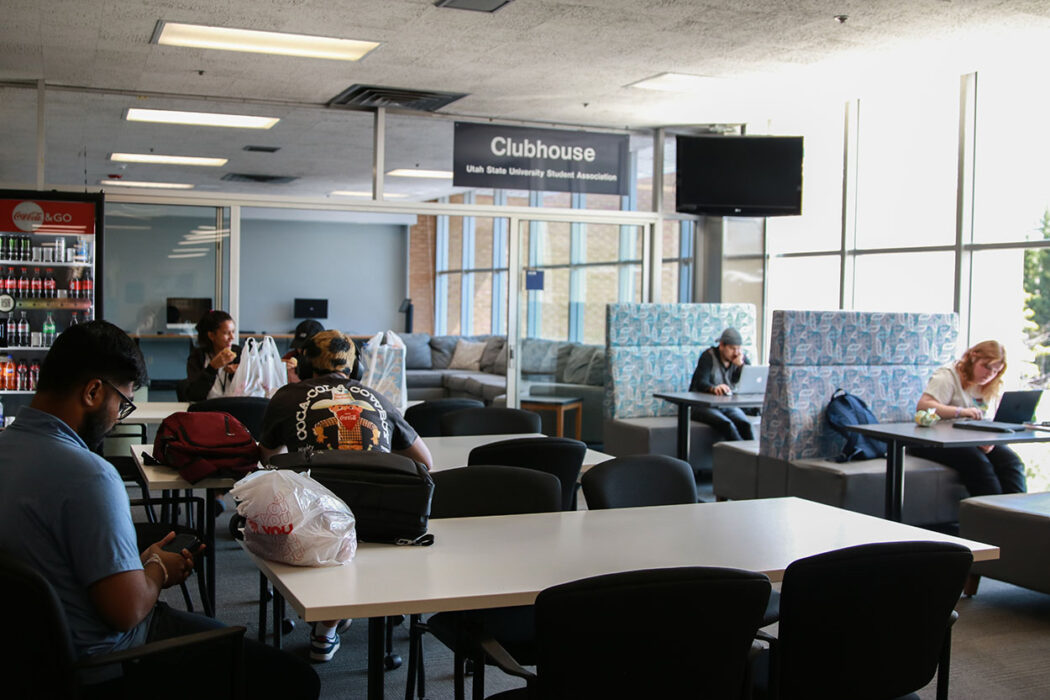Utah State legislature changes campus, students react
This story is published as part of U.S. Democracy Day and the Utah College Media Collaborative, a cross-campus project bringing together emerging journalists from Salt Lake Community College, the University of Utah, Utah State University and Utah Tech University.
When Samson Calderón Diltz moved from his summer student housing in Blue Square Apartments to his fall housing in Richards Hall on Aug 17, he adorned his new space with decor of his choosing alongside the 3500 other students living in on-campus housing. It was to Calderón Diltz’s surprise when he got a knock on his door a few days later, where he was met with a resident assistant telling him to take his transgender pride flag out of his window. It was this event that caused him to take to social media and draft a post that would soon circulate through campus.
The post held pictures of his taken-down pride flag, screenshots of USU websites, policies and Instagram comments expressing disagreement with the new signage policy. Following the photos Calderón Diltz captioned it with a single sentence stating “I couldn’t put my trans flag in my dorm window.” This was followed by four more paragraphs of text with the final paragraph directly calling out the University, USU housing, and President Elizabeth Cantwell.
“Looking into it this is likely a result of HB0261, A bill I personally protested back when it was going through the house back in January. However, I can’t seem to find anything in the specific bill that says I cannot display my trans flag in my window. I want to show that my dorm is a rare safe space on campus. I want to be loud and proud in my identity. It’s just a window on the far end of campus! I should be allowed to have a flag especially when last year many windows on campus were covered in many different flags (including one which had the leader of North Korea on it).” Calderón Diltz’s post read.
Calderón Diltz is correct that this policy is the result of HB0261, which took effect in Utah on July 1, 2024.
The new policy is listed under the USU Policy Library as Interim Policy 541: Free Expression and Assembly. Section 2.4.11 states that “USU may remove and discard any signs, notices, posters, or banners that do not comply with USU policies.” The policy also states that nothing is to be displayed in windows at all.
Samson’s post accumulated 303 likes as of Aug 28 and was seen by many members of the USU community including Graduate Studies Senator Jamie Parry who also took to her own social media on the matter, and shared her thoughts with the Statesman.
“I think it’s dumb that Spencer Cox can say disagree better and then sign in this bill that doesn’t allow people to disagree,” Parry said. “I think, as an officer, our point is to find problems that exist here on campus and disagree with them, whether it be parking policies, whether it be housing policies or tuition increases. People should be able to disagree with what the university is doing, and so with this bill specifically, it kind of almost limits disagreement, which is a problem. As officers, we should be finding positions that the students that we represent are hurt by to disagree with so that hopefully, we can enact positive change.”
Parry also pointed out the larger effects that HB0261 has had on the campus community. Due to this bill, the university has taken a stance of neutrality on the following topics; anti-racism, bias, critical race theory, implicit bias, intersectionality, prohibited discriminatory practices and racial privilege.
“I’m queer, and when I came to Utah State, finding spaces I felt safe in was hard because there’s a very clear culture here that sometimes is scary to come as an outsider to. So whether it be the ally little post that professors used to be able to have, or pride flags in dorm rooms, helped create those safe spaces. So it just makes me really sad that that can’t happen here on campus,” Parry said.
Calderón Diltz shared a similar sentiment to Parry as a student who is a part of the 28 percent of students of color across USU statewide.
“I already feel ignored by campus already, when you see all the pictures of those student models and everything, they’re usually all white. Every time I’m in a room, I can count exactly how many people of color there are, and oftentimes I’m usually the only one and seeing that if you’re staying neutral on anti-racism, in my opinion, that means that you’re not taking a stance against racism at all, in that you are giving racism a chance to flourish,“ Calderón Diltz said.
Calderón Diltz expressed that he will be most likely moving off campus at the end of this semester along with partner Morgan Boase.
Student Advocate VP Sydney Lyman, who chairs the government relations council, shared insight on what the university can and cannot do in compliance with this law in order to keep state funding. She explained that the university is bound at all levels by this state law because USU is a public university. She also shared that any challenge with the housing policy or USU compliance with HB0261 under the guise of the First Amendment would be a challenge at the state level, instead of the university level.
“Ultimately, in my position as Student Advocate, I have a legal obligation as part of the university to uphold the law and communicate to students that if they would like to challenge that law, the place to do it is through the state government, and I’m always happy to provide resources to who is your state representative, how to get in touch with them,” Lyman said. “I really strive to listen empathetically.”
Lyman further explained that this law also affected the USUSA constitution, where statements of belonging had to be removed without voting, which would have happened if this was not a legal matter.
Amanda DeRito, associate vice president for strategic communications, shared an official statement from the university in an email to the statesman.
“As a modern land-grant university, USU’s role is to serve as a catalyst for discourse and engagement, which is best achieved when the institution maintains a position of neutrality. Our community members are encouraged to explore their own beliefs, opinions, and personal values. Neutrality does not apply to academic freedom, curriculum, or research.”
Malory Rau reported and wrote this story as a journalism student with Utah State University’s The Utah Statesman. Her article is part of U.S. Democracy Day, a nationwide collaborative on Sept. 15, the International Day of Democracy, in which news organizations cover how democracy works and the threats it faces. To learn more, visit usdemocracyday.org.



Glad to see this being discussed! The Utah legislature has undoubtedly killed free speech and freedom of expression on campus, all under the thinly shrouded guise of “neutrality;” a neutrality that adopts a white, heteronormative, and religious characteristics as a default due to the pervasive demographics on campus.
Meanwhile, the university — in classic fashion — is either too apathetic, intimidated, or complicit to ever go to bat for their students.
One would think with the university’s ever rotating batch of presidents, students would have the luck of landing at least one executive who decides to put their job before the Sisyphean game of academic politics; a game that slowly lulls all board members and presidents into a damn near legislative coma, or close enough to one as far as students are concerned.
One shouldn’t be too surprised that in the continual cycle of bigotry, sexual assault, or any other manner of horrible actions that occur on campus, the higher ups at the university either adopt a completely laissez-faire attitude or assist in the perpetuation of these events (i.e. covering up assault-allegations against USU’s cash cow sport’s teams). Though naturally, as soon as there is any possibility to remove the influence of queer identities on campus, the university springs to action like a sleeping giant to squash any hope of queer identities.
[…] Rau reported and wrote this story as a journalism student with Utah State University’s The Utah Statesman. Her article is part of U.S. Democracy Day, a nationwide collaborative on Sept. 15, the […]